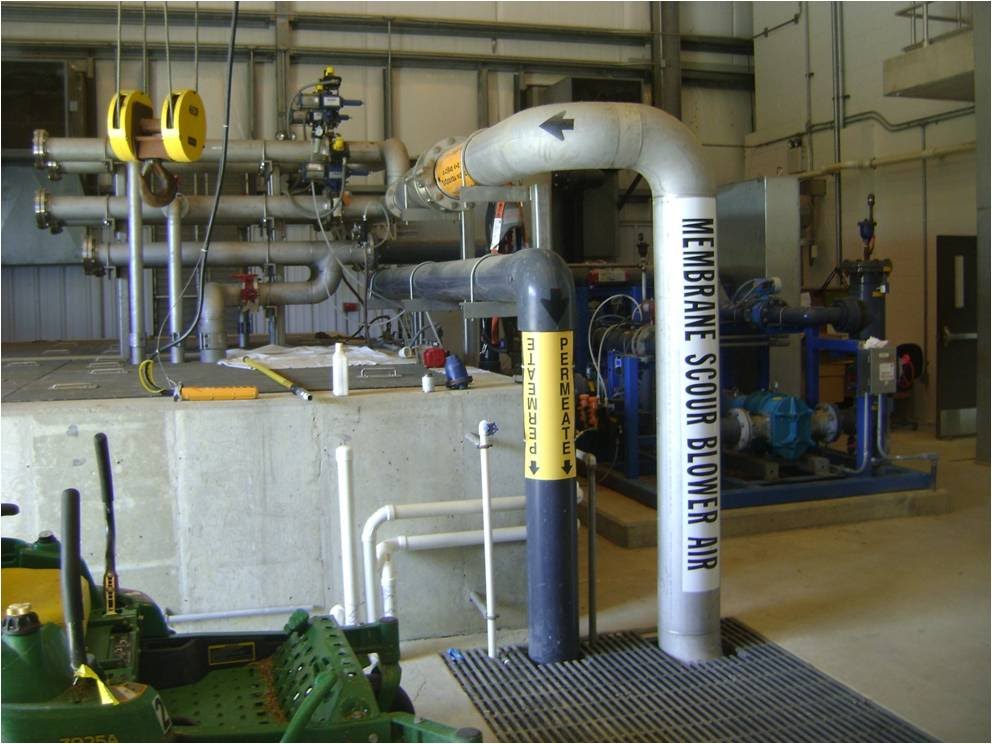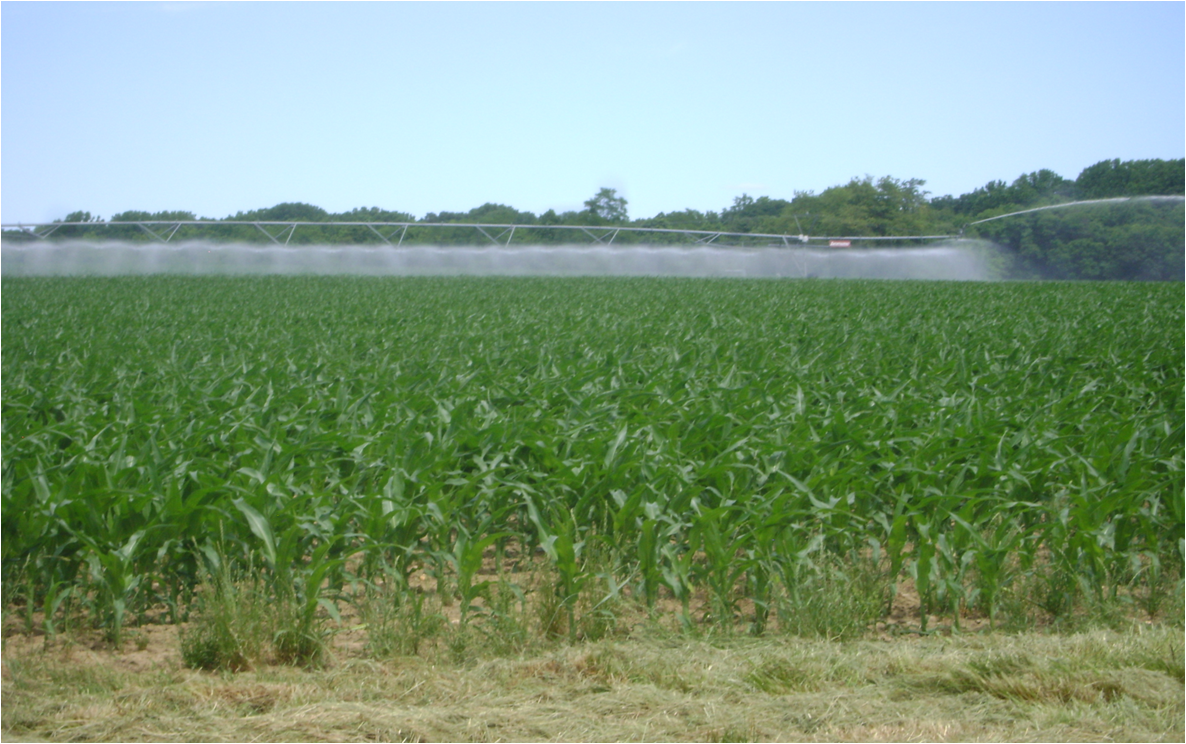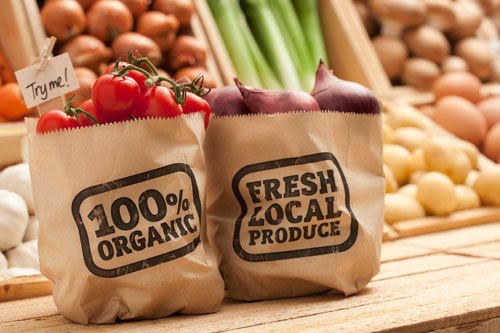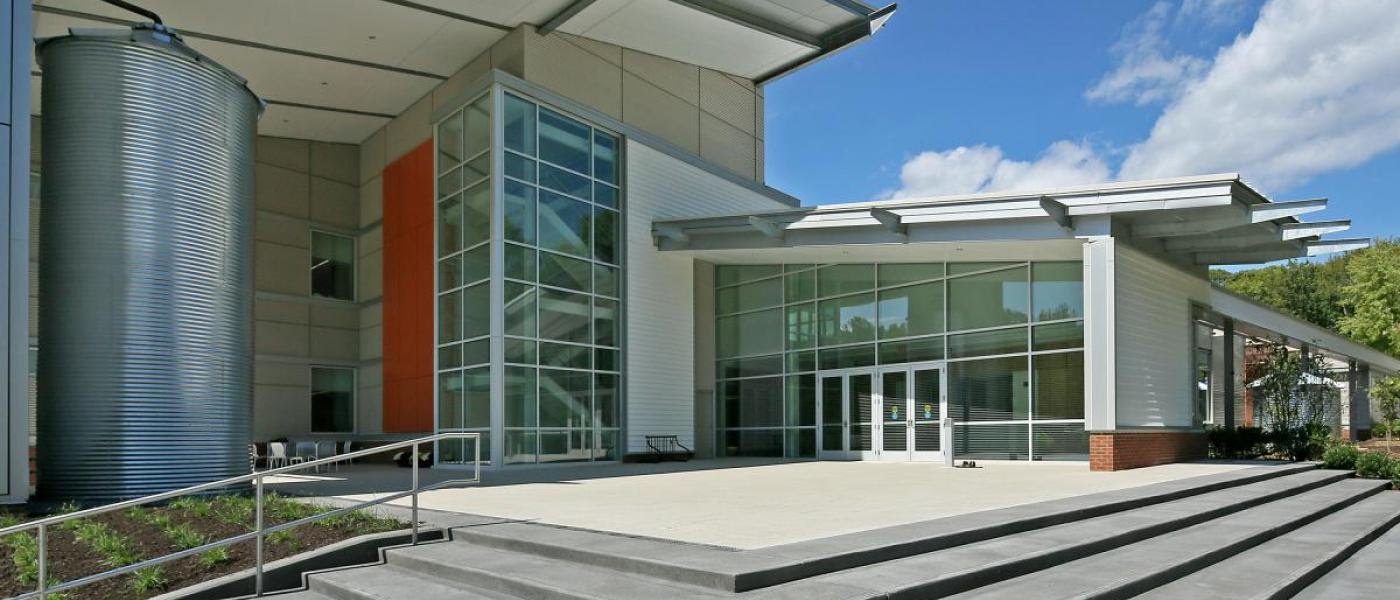 Membrane filter at the Worton wastewater treatment plant (Source: MDE)
Membrane filter at the Worton wastewater treatment plant (Source: MDE)
Worton Farm Irrigation with Reclaimed Water
The rural town of Worton, located in Kent County on Maryland's Eastern Shore of the Chesapeake Bay, has a population of about 250. When the town needed to upgrade it's wastewater plant to protect local water quality and the Chesapeake Bay, it did so with a sequence of treatment technologies including activated sludge, membrane filtering, chlorination and ultraviolet (UV) light processes. The resulting water was of such good quality it seemed a shame to call it "wastewater;" discharging it into nearby brackish tidal waters would seem more like "wasted water."
 Center pivot spray irrigation at the Diller farm near Worton, MD (Source: MDE)
Center pivot spray irrigation at the Diller farm near Worton, MD (Source: MDE)
Simply discharging the water would have been the easy thing to do, but thoughtful people made the effort to find a local farmer who had an interest in reliable irrigation water for animal feed crops. Because the candidate agricultural fields were in a farmland preservation program, additional attention was given to the agronomic water quality properties. This ensured salts will not build up and soil properties will be protected over the long-term.
The project was designed to deliver reclaimed waste water 2-miles by a forced main to the Diller farm irrigation sites involving 76 acres of cropland. The irrigation system was designed for 195,000 gal/day with a 150-day retention time pond for storage, which accounted for wet weather and seasonal periods when the estimated 1-2 inches of irrigation per week was not feasible. Mr. Diller has reported that irrigation with reclaimed water has approximately doubled his crop yield.
 Source: Maryland Department of Agriculture website
Source: Maryland Department of Agriculture website
Simplified Approvals for Small Food Processor Water Reuse
The local food movement is a very positive social and economic trend. Locally processed, value-added products help farms diversify and strengthen their businesses, provide high quality products to their local region, reduce transportation energy use and support local jobs. The State has a strong interest in the success of entrepreneurs who are making this happen.
The State is also responsible for ensuring the water used to process local specialty food products is handled in a way that ensures public and environmental health. These activities usually take place in rural areas without sewer systems, so options for food processing wastewater include directing it to a septic system, applying it to the land or putting it in a holding tank to be hauled away for appropriate offsite treatment and disposal. Ideally, the process wastewater can be reused safely, e.g., to water hops or other crops grown at a farm microbrewery, or other small scale on-farm operations such as cheese and ice cream manufacturing, or merely to recycle the nutrients into plants on the landscape and recharge shallow groundwater that helps keep local streams flowing during dry summer months.
When it became clear that these farming innovators were running into regulatory roadblocks, staff at Maryland’s Department of Environment’s (MDE’s) Waste Water Permit Program (WWPP) worked cooperatively with staff of Maryland's Department of Agriculture (MDA) to reform MDE’s regulations (COMAR 26.08.02.09.A(5)). The simplified approval process works in harmony with the State Chemist at the Maryland Department of Agriculture, classifying the process water as a soil conditioner. This prerequisite allows staff of the WWPP to review the application for exemption from MDEs discharge permit. Staff of the WWPP take the lead with the customer in coordinating this MDE/MDA State agency approval process and ensure that food processors are operating in a safe, fully informed, and environmentally friendly way with minimal bureaucracy.
On-Site Reuse at the Smithsonian Environmental Research Center
The Smithsonian Environmental Research Center (SERC) presents itself as providing "science-based knowledge to meet the environmental challenges of the 21st century." Located 40 minutes East of Washington, DC, on the Rhode River of the Chesapeake Bay, the SERC facilities showcase energy and water efficiency at a LEED Platinum standard. Particularly impressive is that this sustainability design was accomplished for a laboratory, which are notorious high energy and water users.
 Smithsonian Environmental Research Center, Mathias Laboratory, (Source: SERC)
Smithsonian Environmental Research Center, Mathias Laboratory, (Source: SERC)
The lab uses solar panels and geothermal wells to support energy needs. Smithsonian Magazine describes the water reuse:
... everything that goes into the building is used and used again. Water from lavatory sinks is filtered for reuse in toilets and the fire suppression system. The reverse osmosis system, which makes ultra-pure water for experiments is also looped into that same “gray water” system. In most labs, that’s one of the big water-wasters that other buildings don’t have to deal with. A reverse osmosis system yields about 30 gallons of ultra pure water for every 100 gallons of tap water. The rest is usually lost down the drain. When all that water is eventually flushed down the toilet, it goes to an on-site waste-water treatment plant for processing. Even that gets re-used again to nourish a four-and-a-half acre constructed wetland that provides habitat for wildlife. And, true to form, even that has a dual life as a storm water control feature.
Not only is the innovative SERC lab design a success in its own right, the lab's leading edge experience helped to push the State of Maryland forward in the arena of on-site, or "distributed," water reuse implementation. It serves as a successful case study that will make it easier for others who wish to follow in its footsteps.
Up Next: Water Reuse Partnerships
The viability of achieving Maryland's water reuse goals depends on strategic partnerships to leverage expertise and resources. That is the subject of the next section of MDE's water reuse website.
See Maryland's Water Reuse Partnerships webpage. (Next Page)
Contact Information
Please direct questions or comments to Jim George.
